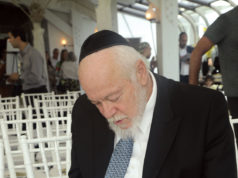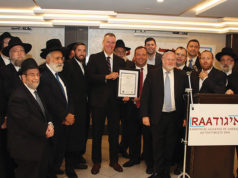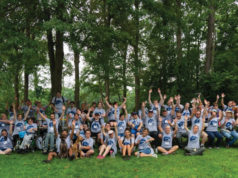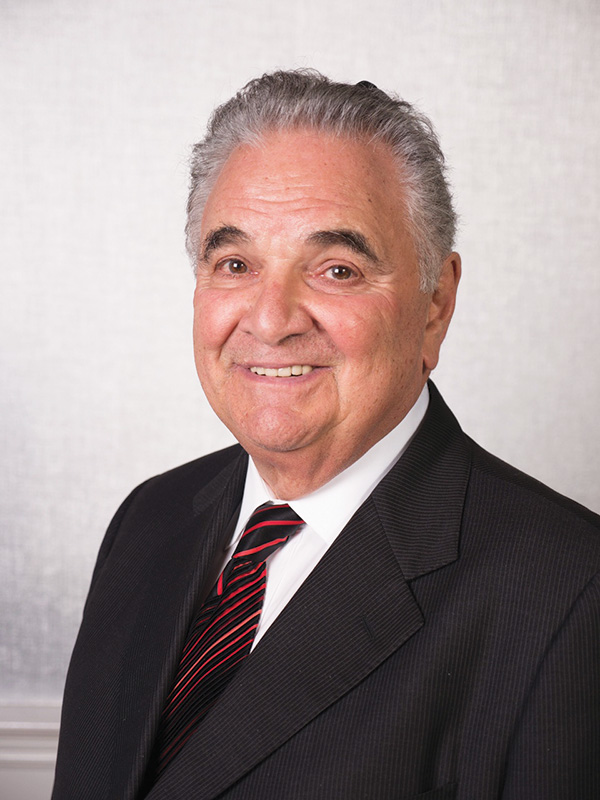
“GUYS, GUYS! WHAT ARE WE DOING HERE? LET’S FINISH THIS AND DO WHAT IS BEST TO HELP THE PEOPLE!” THAT’S THE MANTRA OF BUNNY ESCAVA AS HE BRINGS DIFFERING OPINIONS AROUND THE TABLE TO A MEETING OF THE MINDS THAT FOCUSES ON THE GOAL OF HELPING PEOPLE.
Bunny has been president of the Ahi Ezer organization since the passing of Nouri Dayan A”H, a promise he made to both his father Isaac and Nouri on his deathbed. Isaac Escava A”H had been the organization’s treasurer for many years.
The job is not easy, as Ahi Ezer is not just a synagogue. It’s a complex of buildings that include the synagogue, services, senior citizen housing and programs, two yeshivot, a men’s mikveh, a kollel, and library, built by Nouri Dayan A”H and David Bibi A”H.
As president, Bunny takes into account different personalities and philosophies, varied needs, and many different ethnicities among the people who use their services. The central theme is always Shalom, doing hesed, doing what the people need. From that, Bunny says he gets great personal satisfaction, knowing that his efforts have helped so many people.
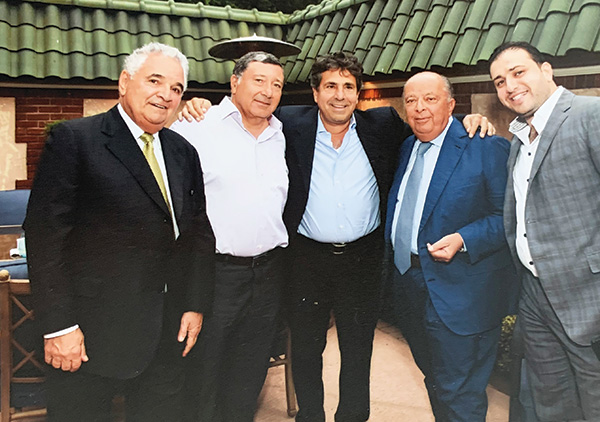
“Every time I go to Bunny with an issue, when I don’t know how to resolve something, he says to me ‘Do what your heart tells you to do. That’s how he leads,’” said Ahi Ezer’s Executive Director Eliot Harary.
Bunny Escava walked the streets of Bensonhurst as a young child, holding his father Isaac’s hand as they attended Ahi Ezer Synagogue on 71st Street off Bay Parkway. Isaac Escava was dedicated to Ahi Ezer and close friends with David Bibi and Nouri Dayan.
The impact of his father’s volunteer work and his commitment to the Ahi Ezer complex and community needs stayed with Bunny for his entire life. Although his family moved to East 4th Street in 1946, they continued to attend the Bensonhurst synagogue until the new building was completed on Ocean Parkway and Avenue S.
Dubbed Bunny (his real name is Hymie) as a baby because he was born on Easter Sunday and his aunt thought he was “as cute as a bunny,” Isaac Escava told Bunny more than 50 years ago that he had to stay committed and involved with Ahi Ezer.
“My father took me to meet Nouri Dayan and David Bibi, and we walked around the buildings. I will never forget what Nouri told me. “’Keep making Ahi Ezer bigger; the money will come.’ They had foresight to open the yeshivah and saw it as a tremendous need.
“They had the motivation to take everyone in, wealthy or poor. Nouri said, ‘Don’t worry about the money, G-d will help you and it will all work out.’ Over the years, he was right. Every time we were in a crunch, somehow, we made payroll or got a donation to tide us over.
“I will never forget one day I had a meeting with Nouri about money for the yeshivah. We had to pay the employees and didn’t have the payroll. I was worried. Nouri said ‘G-d will help us; we have never failed in anything we have done. I left the meeting feeling better. Believe it or not, we made things happen. Just as Nouri said, G-d will make sure we never fail.”
Now, president of the entire Ahi Ezer organization and complex, Bunny said he made a promise to Nouri Dayan to stay president indefinitely.
There are three senior citizen buildings (one on Kings Highway and two buildings on East 7th Street and Avenue S) with 140 units and about 200 residents, according to executive director Eliot Harary. Overall, Ahi Ezer employs 60 people, not including the yeshivot staff. The elementary school has about 200 students and the girls’ high school has about 80 students.
The senior citizen buildings are funded through the US Department of Housing and Urban Development, with program funding from city and state grants. Residents pay about 30% of the market rent, a maximum of $600 a month. Donations by residents are used for building enhancements and updates, such as air conditioning in the hallways and the second elevator recently installed in the Kings Highway building. Ahi Ezer runs a robust program, daily meals in a partnership with the JCC of Greater Coney Island, Shabbat meals, holiday parties and weekly programs for the seniors.
While programs have minimized during the past year due to Covid 19 restrictions, things are beginning to loosen now that all residents have been vaccinated.
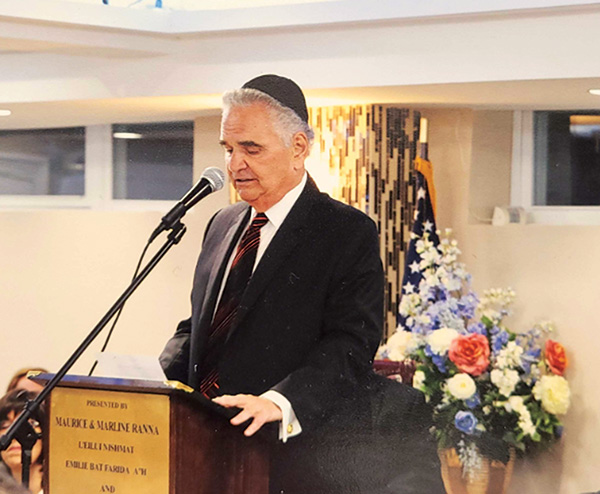
Even a death does not stop the celebrations as it is critical to the moral of the residents. “One day I got a call from the program director at the Kings Highway building. It was right before Hanukkah, someone died, and she wanted to cancel the party. I left my office in the city to speak to her directly,” said Bunny. “If you ever stop a party, there will never be a party again, life has to go on,” he told her. “The party went on and while only half the people attended, they hugged me and thanked me for having the party. We don’t cancel any parties because these people are old, and they need them.”
One of the most significant aspects of Ahi Ezer—a mission driven by the vision of Nouri Dayan and David Bibi—and carried out by Bunny Escava, is the total and complete commitment to help people, no matter what their means.
While the synagogue and senior buildings are stable financially, the yeshivot need significant fundraising because parents struggle financially, and the schools grant tuition assistance to a majority of families. Fundraisers and drives are held in Deal and Brooklyn each year to help the schools meet payroll and pay expenses. Sam Domb, a Holocaust survivor, has been a supporter of the yeshivah for more than a decade.
To illustrate how the belief that G-d will provide drives the mission of Ahi Ezer, Bunny gave this example. “We were having a drive in the Deal shul and I arrived at 5:30 am for the Vatikan minyan. Usually during a drive, I have helpers who know the people, give out pledge cards and collect them, but on this particular Shabbat I had no one to help me. How was I to remember all those pledges? Of course, I couldn’t write them down. It was scary. I made four speeches. I was so upset when I left the synagogue I was crying. Tears were streaming down my face. I couldn’t go home and let my wife see me like that, so I stopped at my neighbor Joe Cayre’s house.
“I just wanted to vent and calm down before I went home. He asked me how much I lost. I told him. He looked me in the eyes and said come after Shabbat and pick up the check. I said I am not asking for the money. But when someone gives to the organization you have to take it, you are the messenger. I did not want to take the money and he said don’t worry. When I left, I thought about what Mr. Dayan told me, that G-d will provide.”
Bunny does not take credit for all of the accomplishments of Ahi Ezer. He believes he is there as a messenger, an extension of Nouri Dayan and David Bibi. In fact, he is humbled by the great people who are committed to Ahi Ezer—the staff who work at lower than market salaries, the donors, the people who work in the offices with Eliot Harary, such as Victor Bibi, Eddie Mizrahi and Joey Cohen. And of course, the committee of dedicated board members, among them Aslan Bawabeh, Albert Ayal and Seymour Escava—who are just as committed as he is.
“We believe G-d will help us and we take families in at the yeshivah, even if they have nothing. Recently, a donor called and asked if the yeshivah needed money and I told him we are always behind. He sent me a large check ten minutes later. I almost fell off my chair.”
Of the most significant impact was the creation of the Sephardic Community Center, a dream for the community driven by the leadership of Morris Bailey, among others. At the time, Ahi Ezer owned the building on the property and intended to use the space for senior citizen housing. At the request of Morris Bailey, Bunny was sent to ask if they would sell the building for use as the Center. The answer was a quick yes because the community needed a community center. A plaque inside The Center recognizes Ahi Ezer.
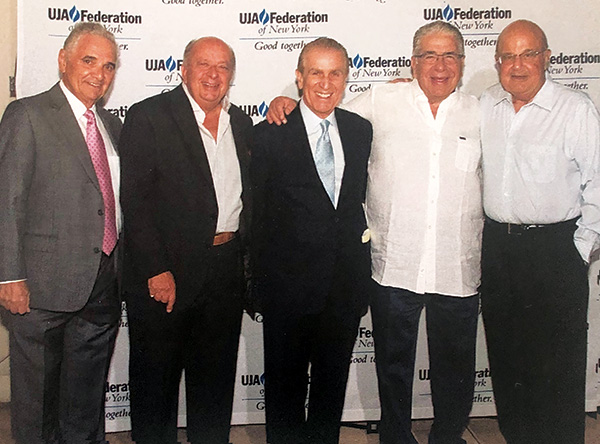
“When we built The Center no one knew how to run it. We relied on the UJA Federation to help us and the JCH on Bay Parkway. They directed us. UJA got us a director, who till today is my good friend, Mike Witkes.” Bunny worked for several years as a board member and was the third Center president.
“My brother Seymour always pushed me to make sure we did the right thing for the community. Now there is a huge demand for senior apartments; it’s staggering. People can’t afford to pay rent.
“I can’t even attempt to tell you how much personal satisfaction I get from giving my time for the community. I am pretty successful in my work and I believe that it is because of the volunteer work I do for the community. G-d rewards me because of the hesed I do. I believe that in a big way,” concluded Bunny.
SARINA ROFFÉ

